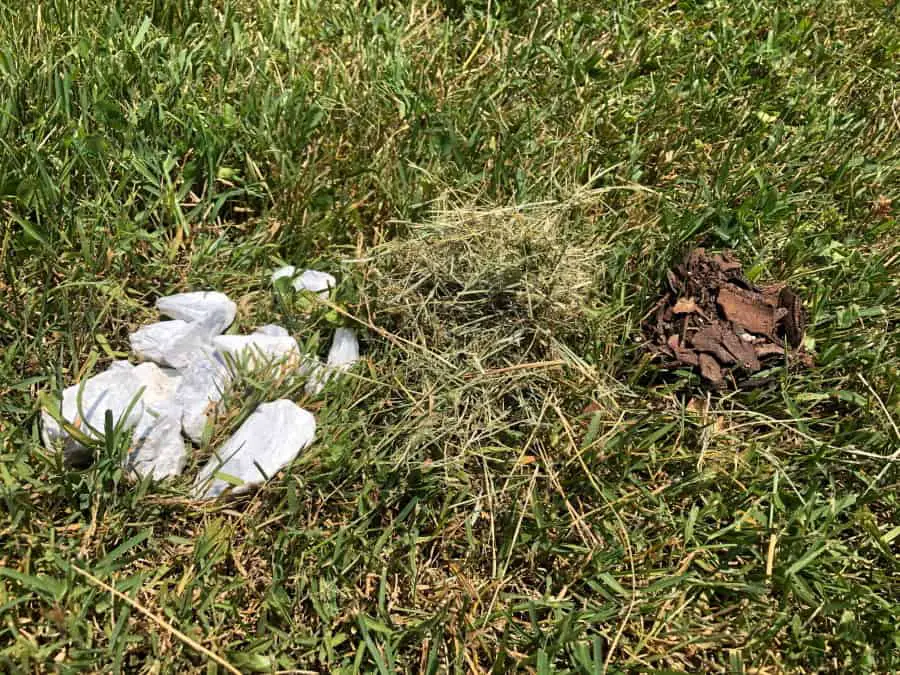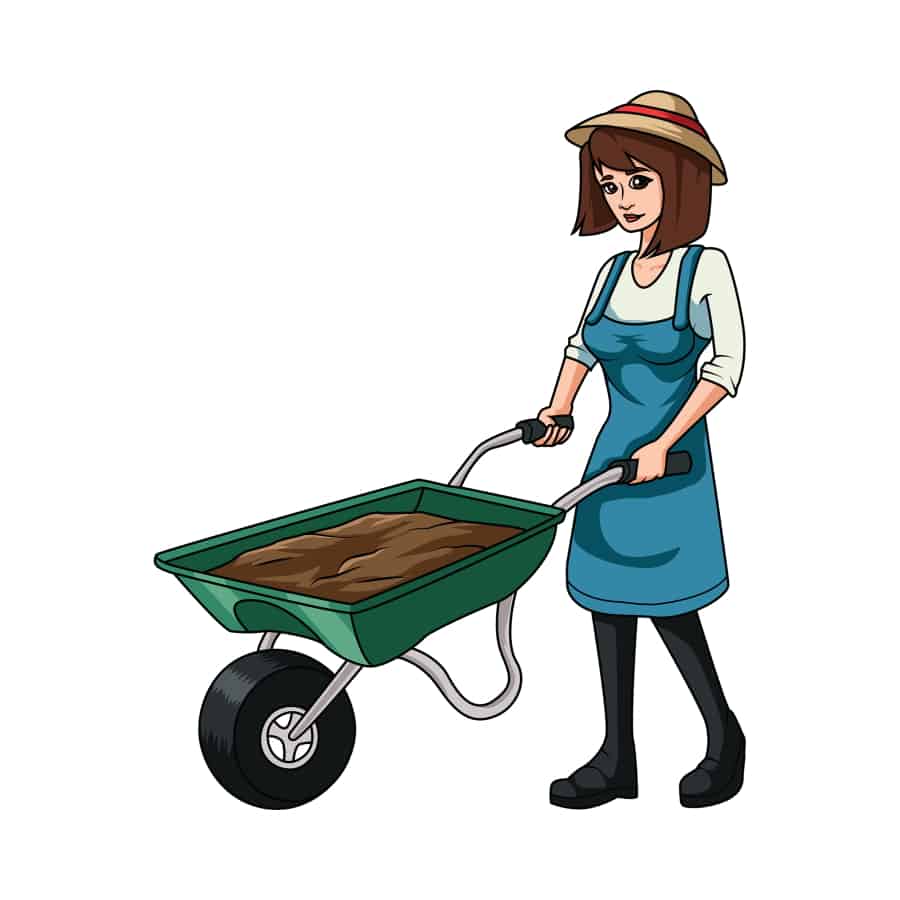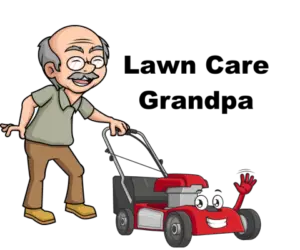Growing the perfect, patch-free lawn is often a long and frustrating battle that can sap any seasoned gardener’s hope. What weapons can aid in the pursuit of greener pastures? Is there a way to accelerate the growth of grass?
Some organic mulch types of mulch help grass grow and spread throughout a lawn. Moderate covering in grass clippings for example provides seeding, protection, and water retention. Inorganic mulches are normally designed to do the opposite and discourage grass growth and spread.
The following article addresses these and more questions, as we discuss the topic of mulching. We will discuss how the practice of mulching impacts grass and your lawn, specifically. Let’s get right into it!

Contents
Does Mulch Help Grass Grow In Most Lawns?
Short answer…yes!
The process of mulching is a fantastic way to speed up the growth rate of all species of grass. Not only does mulching grass cuttings and re-spreading them over the lawn help grass grow, but it also serves a protective function for the grass and the soil below.
The Natural Resources Conservation Service (NRCS), a wing of the U.S. Department of Agriculture, defines mulch as a “protective layer of material that is spread on top of the soil”. The “materials” can be organic or inorganic, and each category of material has inherent positives and negatives for soils and grasses.
Inorganic Mulches Prevent Grass From Growing
Inorganic mulches are less common, but they are extremely useful for containing soil moisture and preventing the germination of weeds.
An inorganic mulch layer can be made up of:
- stones
- rubber
- plastic sheeting (or clippings)
- artificial mulch
- loose gravel
This type of mulching is often used for plant and vegetable gardens rather than for grass.
Inorganic mulching will only benefit your grass if you wish to suppress weed growth and pack in the soil’s moisture content. Otherwise, it does not add any nutritional benefits to the soil and, subsequently, to grass.
Keep in mind that inorganic mulch is typically not used for grasses and only in very specific circumstances would it even be beneficial. These types of mulch are usually used for suppression rather than propagation of grass.
One very common use for rubber and other inorganic mulches is in children’s playgrounds. It adds a layer of protection against falls, doesn’t attract animals like cats and rodents in the way sand does, and keeps down any grasses and weeds from growing through, in, or on the mulch itself.
Organic Mulch Can Promote Or Prevent Grass Growth
Organic mulching, on the other hand, is far more common for both plant beds and grass patches. Various materials can serve as organic mulch.
These include:
- grass clippings
- wood shavings
- wood chips
- compost
- straw
- animal manure
While people may use organic mulch for its protective qualities, the main benefit of this form of mulching is the nutritional benefits. Organic mulches are so-called because they decompose with time. Their nutrients are absorbed into the soil and whatever plant life is on it.
Organic mulching is the better choice for most grasses because it satisfies multiple needs besides nutrition.
- Firstly, unlike inorganic materials, organic mulch does not need to be removed because it decomposes.
- Secondly, well-timed mulching will provide adequate compactness and breathability to the soil as and when required.
Another benefit is that organic mulch can serve as a functional ecosystem that features rich nutrients, minerals, as well as organisms and micro-organisms that make innumerable contributions to soil quality.
Mulched grass also benefits from greater water retention.
Evaporation can be significantly reduced in hot areas, which allows you to water your grass less and at any time of the day without fear of the soil drying out within a couple of hours. Less watering will also trim a few bucks off your water bill, which is always nice.
Mulch protects immature grass and grass seeds as well from harsh environmental conditions like cold and heat. Rain and other forms of precipitation can also wash away grass seeds, but that can also be prevented through mulching.
If you would like to learn more about grass, mulches, or gardens then check out some of my other articles on these topics…
Does Grass Grow In Or Through Mulch?
There are two parts to an answer to whether grass can grow through mulch. If you are talking about organic mulch in your lawn’s grassy areas it is quite different from organic and inorganic mulches in flower beds meant to suppress grass growth.
Grass grows easily through organic mulch meant to be placed on lawns which include: straw, grass clippings, light compost, or animal manure. Grasses will have a very hard time growing in places where thick layers of organic or inorganic mulch are laid like pine bark, pine needles, or rubber chips.
The application of the material also plays a significant role. Layers of solid mulch that are 1.5 to 2 inches thick will more than likely smother any grass that it covers. The type of grass and type of mulch will determine grass survival.
Can Grass Grow Through Mulch In Flower Beds?

Grasses at any stage of development can grow through most types of mulch, provided it is organic mulch. Even thick layers of mulch can’t totally keep some types of hardy grasses from growing through, on top of, or spreading into flower beds.
Grass can grow through mulch in flower beds, especially if it is not the right type of material. The thickness of the mulch layer also plays an important role in grass suppression. Not only can grass grow through mulch in beds, if the mulch has sufficiently decomposed, it can grow on or in it.
One way to ensure that grasses can’t grow through mulched beds is to apply an adequately thick layer of preventative mulch (pine straw, pine bark, synthetic chip mulch, etc.). Another is to line the grass or soil to be covered before mulching with gardener’s felt (my recommendation on Amazon) or some other type of weed prevention cloth/plastic.
Several mulch types will cause grass to grow. This depends on what is in it and how decomposed it is.
Jerry McMillan, McMillan Lawn Service, 40 Years Experience, Great Grandpa
Inorganic mulch would serve as an obstruction for maturing grass or grass seed and, depending on the type, it would be difficult to remove when the time comes. This would be a semi permanent solution to most flower bed weeding problems.
Both forms of mulch would provide protection from the elements, but organic mulch’s state of decay would also allow the nutritionally boosted grass to penetrate easily. This may be good for your lawn if the right mulch is added, but could be a problem for those wanting to mulch beds.
Can Grass Grow Through Mulch In A Lawn?
It is important to add a layer of mulch that is appropriate for your grass’s stage of growth. For grass seeds, you only need less than a ¼ inch layer of mulch and some light watering. It is important that you even out the mulch layer at this stage.
Grass most definitely can and will grow through mulch put on a lawn to protect and nourish it. Grass benefits from clippings or other mulch types designed for yards through protection from wind, animals, and water runoff. If an adequately thin layer is applied, it can increase growth exponentially.
You can be a little more generous with mature grass and apply as much mulch as you need. Just be careful with your watering to avoid smothering the grass.
Just throw garden mulch into the yard and watch grass grow. The mulch will make the grass seed think it’s a flower bed and then it will grow.
Jerry McMillan, McMillan Lawn Service, 40 Years Experience, Great Grandpa
Classic landscaper/grandpa joke – I’ve heard Jerry use it often. This usually is the go to one when there are those one or two spots in the yard that resist grass with everything it has.
A common way to maintain a lawn and thicken the growth and thatch is to mulch grass clippings back into the yard. This is considered a type of mulch for a yard that aides in not only protection and water retention, but some grasses are able to sprout new clumps or shoots from grass mulch that reaches the soil.
Is Mulching Better For Your Lawn?
With the possibility of over mulching, mulching to soon, or selecting the wrong material, is it even advisable for your lawn?
Mulching your lawn organically is an excellent choice if you want it to reach its maximum potential. In addition to the nutritional benefits, the lawn will be shielded from extreme heat during summers and the cold winter, allowing you to have an evergreen lawn all year round.
Lawn clippings are the best form of organic mulch for your lawn, in terms of nutritional content, availability, and affordability. It’s as simple as gathering the mowed grass clippings and scattering them back into the lawn.
Lawnmowers with mulching functions are the ideal tool for the job. Just make sure to eliminate clumping as this could hinder growth.
The main nutrient found in lawn clippings is nitrogen, which is used for the production of chlorophyll, a key component of photosynthesis. Photosynthesis is what gives a healthy lawn its luster and sheen. Nitrogen from the broken-down clippings is processed in the soil by enzymes and then absorbed by the living grass.
Experts indicate that a typical suburban lawn requires 4-5 pounds of nitrogen every year for optimum health. Regular recycling of lawn clippings alone can contribute 1-2 pounds of nitrogen per year.
Make sure to avoid using overgrown lawn clippings, if possible. Longer clippings require more time to decompose, which increases the risk of clumping. Also, try to mow your grass while it is dry because wet grass clumps easily.
Is Mulch Good For Grass Seed?
As we have already highlighted, organic mulch is suitable for grass seeds and maturing grass. The keyword here is organic. Inorganic mulch is a physical obstruction that could smother the budding shoots. The process of removing some types of inorganic mulch could also disturb the delicate grass seed.
Mulch like straw, hay, or other types of thin organic material are good for grass seed and protects it from the elements and animals. It allows sunlight through, protects against wind and rain removing the seed, and hinders birds and rodents from eating them.
Some types of inorganic mulch, like plastic sheets, may be used for short periods (i.e., during heavy rain) as a protective measure. This has been known to work for extreme temperatures, sun exposure, and icy conditions like frost.
However, organic mulch is a better “permanent” choice. Not only will organic mulch increase the soil quality, but it will inhibit the growth of weeds and help the soil remain moist for longer.
Special care must be taken to distribute the mulch evenly so the grass can grow at an even pace. Avoid clumping and incorporate a 50-50 mulch-to-soil visibility ratio to ensure the emerging grass grows unhindered.
Tip From The Experts: If mulch is not desirable due to weather or terrain, another simple solution we have used for many years is to mix in annual rye grass seed with the desired perennial seed. The rye sprouts and grows faster to take on the job of hay or straw in creating a protective barrier. It dies off eventually leaving a rooted perennial in its place.
Having trouble with your grass seed taking root? You are not alone. Most landscapers run into this from time to time themselves…
Grass seed will always grow in cracks of the driveway or in flower beds, but rarely in the lawn.
Jerry McMillan, McMillan Lawn Service, 40 Years Experience, Great Grandpa
(Another landscaper’s classic joke)
Mulching also introduces a myriad of micro-organisms that quickly reproduce and get busy enriching the soil, which accelerates seed germination. Keep in mind that your lawn is a tiny ecosystem in itself. These ecosystems can work for you or against you depending what you add or take away from them.
Final Touches On Mulch Helping Grass Grow…
Sometimes mulch is referred to in different contexts and pointing to its different uses. Mulching up grass clippings or leaves is one type that is used for a specific purpose. There are also wood chips and straws of many types that are used for a completely different goal.
Then there are synthetic versions of numerous materials which have their own specific applications.
Grasses can literally grow through all of them to a lesser or greater extent. Its ability to grow through mulch will greatly depend on the application and goal of the one laying the mulch.
A few simple rules can make the process of selecting and spreading the right mulch for the job easier:
- Mulching grass into the lawn in moderation is good for grass. Grass will definitely grow and thrive through grass clippings.
- Mulching leaves into the lawn in more than a minimal level can be detrimental. Composted leaves are too acidic for soils supporting grasses. Grass will have trouble growing through even moderate levels of leaf mulch.
- Pine bark and pine needles are excellent mulches for hindering grass and weed growth. Grass will generally not grow through pine bark or pine needle mulch.
- Rock or rubber mulch collects heat from the sun and creates too dry and warm of an environment for most grasses to grow. Grass will generally not grow well through rock or rubber mulch.
If you liked this article on grass and mulch, then you will want to read my other articles…
Other References
https://www.ariens.com/en-us/company/blog/316/mulching-grass-a-natural-fertilizer-for-your-lawn
